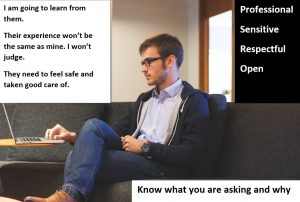A good interview feels like an engaging conversation, even if it’s more one-sided.  How do people describe their experience of a good conversation? And how does that relate to interviewing?
How do people describe their experience of a good conversation? And how does that relate to interviewing?
No matter what the topic, the themes are about being truly heard, valued and respected. To become a good research interviewer you consciously introduce these values.
- Being heard and truly understood: “I felt as if you really knew what it was like for me”
- Feeling valued – even if you disagreed. “My point of view was different but I felt it was still respected”
- Let you express yourself: “I wasn’t rushed into anything; I could say exactly what I needed”
- The other person thought about what you said: “They were trying to really unpack what I was saying”
- Learning something new: “I hadn’t realised that before. It was interesting to see it that way.”
- Connecting with similar ideas/values: “I felt I had met someone who came from my side of the tracks”
- Honesty and authenticity: “There was no BS, no trying to impress each other. It was real.”
- Being a focus,the centre of attention: “I felt like I was someone quite important. Even if it was only for a while”
How can you manage all this?
Preparation. Not just knowing what questions you are going to ask and what kind of understanding you are looking for. It’s about getting into the right mindset. It comes easily once you have the right attitudes.
A research interview is more of a one-sided conversation. The effect on the participant is the same, but to avoid bias the interviewer does not give away any information about themselves. This is fine, if its explained at the start.
“This session is to help me understand what you think and feel, and its important to get your perspective. My role is just to ask the questions, keep time and make sure everyone has a chance to say what they want to say. I don’t add my view because I don’t want to bias you.”
As long as you are not being leading, technicalities don’t matter (much). Focus totally on your participants and get in the zone.
A good interviewer shows they are listening with ‘repeat receipts’. For example: “uhmm” , “cool” , “great”, “that’s interesting”. In groups, the moderator can praise everyone “we are getting some really good stuff here, thank you”.
Remembering key points that were mentioned earlier makes the participant feel their views are important.
Using their language helps build rapport and a sense of shared understanding.
Summarising, clarifying and paraphrasing ensure the interviewer has correctly interpreted the meaning of what was said. Participants realise how useful they have been, and may get a fresh perspective themselves.
USE
All forms of open questions: who, what, why, where, when, how?
Indirect forms of Why: “what was it about that…….?” “How was it that you…..?” “what’s the story here?”
Probes that ask the participant to tell you more: e.g. “Tell me more about….” “Can you elaborate………….?” “Can you give me an example?” “Can you describe that for me?” “What makes you say that?”
Questions to clarify meaning – “when you said ‘convenient’, what exactly do you mean by that?” “What does ‘confidence’ mean to you”
NOTICE
With open questions and paraphrasing you will find it hard to be leading. And if you check your understanding every now and again – “Have I got that right?” – you can correct any misperceptions.

